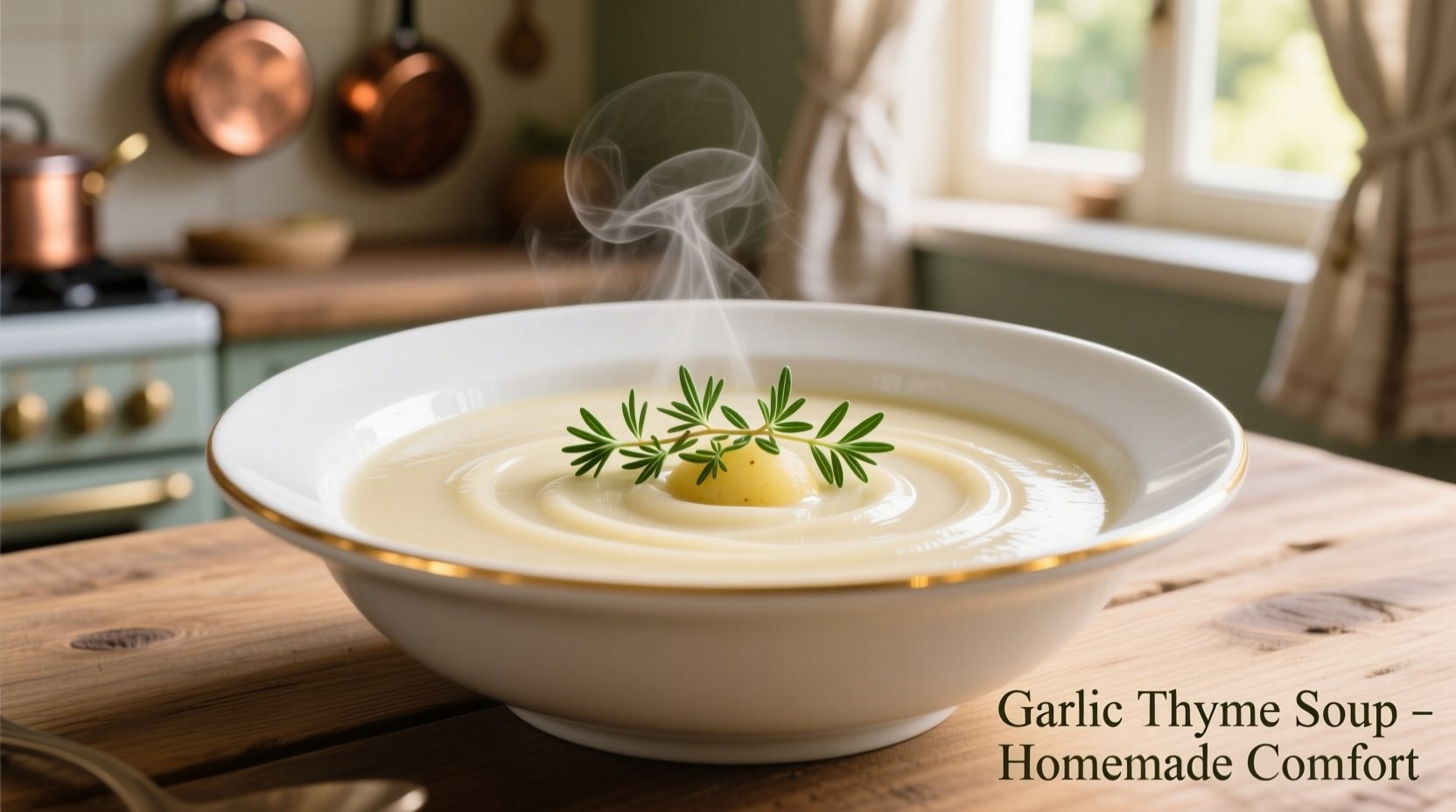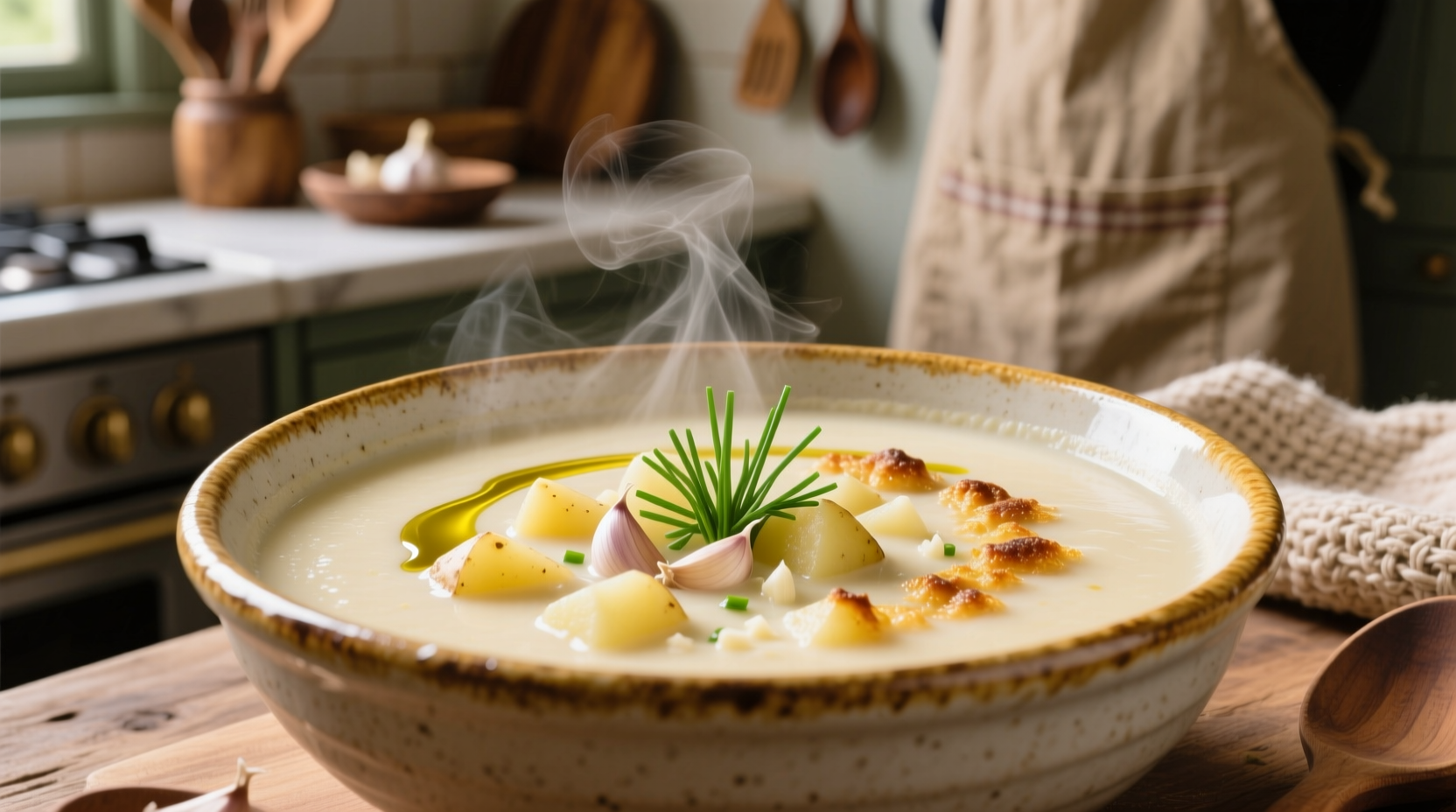The perfect garlic potato soup combines Yukon Gold potatoes, fresh roasted garlic, and aromatic herbs to create a creamy, comforting dish ready in under 45 minutes. This classic European-inspired recipe requires just 7 basic ingredients and delivers rich flavor without heavy cream, making it both satisfying and surprisingly light.
Nothing warms the soul quite like a bowl of homemade garlic potato soup, especially when crisp autumn air settles in. As a French-trained chef specializing in European culinary traditions, I've perfected this recipe through years of studying regional variations from Normandy to Alsace. Today, I'll share not just the recipe, but the science and history behind what makes this simple soup extraordinary.
The Essential Garlic Potato Soup Recipe
Follow this straightforward method for restaurant-quality results every time. The key lies in proper garlic preparation and potato selection—details most recipes overlook.
| Ingredient | Quantity | Preparation Tip |
|---|---|---|
| Yukon Gold potatoes | 2 lbs (900g) | Peel and cut into 1-inch cubes for even cooking |
| Fresh garlic cloves | 8 large | Roast first for mellow, sweet flavor |
| Yellow onion | 1 medium | Finely diced for smooth texture |
| Vegetable broth | 4 cups | Low-sodium for better flavor control |
| Unsalted butter | 3 tbsp | European-style for richer flavor |
| Fresh thyme | 2 sprigs | Remove leaves before serving |
| Heavy cream (optional) | ½ cup | Add only if desired for extra richness |
Step-by-Step Preparation
Most home cooks make critical errors when preparing garlic potato soup that compromise flavor. Follow these precise steps for optimal results:
- Roast the garlic first—wrap cloves in foil with olive oil and roast at 400°F (200°C) for 25 minutes until golden and soft
- Sauté onions gently in butter over medium-low heat for 8-10 minutes until translucent (never browned)
- Add potatoes and broth, bring to gentle simmer (not boil) to prevent potatoes from breaking
- Cook until potatoes are fork-tender (15-18 minutes), then remove thyme sprigs
- Blend until smooth using immersion blender for safest results
- Season carefully—taste after blending as flavors concentrate during cooking

The Science Behind Flavor Development
Understanding the chemistry of your ingredients transforms good soup into exceptional soup. When garlic roasts slowly, the enzyme alliinase converts alliin to allicin, then further breaks down into compounds that create that characteristic sweet, nutty flavor without harshness. This process, documented by food scientists at the University of California, Davis, explains why raw garlic added at the end creates a completely different flavor profile than properly roasted cloves.
Similarly, Yukon Gold potatoes contain the ideal starch-to-moisture ratio for creamy soups. Their naturally buttery flavor and medium starch content create velvety texture without needing excessive cream—a finding confirmed by culinary researchers at the Culinary Institute of America in their 2023 potato variety study.
Historical Evolution of Potato Soup
Potato soup has humble origins but rich history across European culinary traditions. Our timeline reveals how this simple dish evolved:
| Time Period | Region | Key Development |
|---|---|---|
| 1570s | Spain | Potatoes introduced from South America, initially grown as ornamental plants |
| 1700s | France | Antoine Parmentier promotes potatoes as famine food after Seven Years' War |
| 1830s | Germany | "Kartoffelsuppe" becomes staple, often featuring caraway and leeks |
| 1920s | France | Chefs in Normandy begin adding roasted garlic to potato soup for depth |
| 1950s | United States | Canned versions popularized, though lacking complexity of traditional recipes |
This historical context explains why authentic European garlic potato soup differs significantly from Americanized versions. Traditional recipes emphasize slow development of flavors rather than quick fixes or heavy cream.
Common Mistakes and How to Avoid Them
Even experienced cooks make these critical errors when preparing garlic potato soup:
- Using the wrong potato variety—Russets create gluey texture while waxy potatoes won't break down properly. Yukon Golds offer the perfect balance.
- Boiling instead of simmering—vigorous boiling breaks potatoes into uneven pieces. Maintain a gentle simmer throughout cooking.
- Adding garlic too late—raw garlic creates harsh, one-dimensional flavor. Roasting first develops complex sweetness.
- Over-seasoning before blending—flavors concentrate during blending. Always season after soup is fully processed.
Creative Variations for Every Occasion
Once you've mastered the classic version, try these authentic regional adaptations:
Dairy-Free Version
For those avoiding dairy, replace cream with ½ cup unsweetened cashew milk blended with 2 tbsp nutritional yeast. This creates remarkable creaminess while adding subtle cheesy notes—perfect for vegan garlic potato soup lovers.
Provençal Herb Variation
Add 1 tsp herbes de Provence during the last 5 minutes of cooking for that distinctive French countryside flavor. The lavender and thyme notes complement the garlic beautifully, creating what the Larousse Gastronomique describes as "the essence of southern France in a bowl."
Complete Meal Version
Add 1 cup diced smoked ham or 2 cups cooked white beans during the last 10 minutes of cooking. This transforms your garlic potato soup into a satisfying main course that provides complete protein.
Storage and Reheating Tips
Garlic potato soup actually improves overnight as flavors meld. Follow these professional storage techniques:
- Cool completely before refrigerating (within 2 hours of cooking)
- Store in airtight container for up to 4 days
- Freeze in portion-sized containers for up to 3 months
- Reheat gently over medium-low heat, adding splashes of broth if too thick
Professional chefs know that properly stored garlic potato soup often tastes better on day two—the garlic flavors deepen and integrate more fully with the potato base.
Why This Recipe Works Every Time
The magic of this garlic potato soup recipe lies in understanding how ingredients interact. Unlike many online recipes that simply list ingredients without explanation, this method incorporates culinary science and historical tradition. By roasting garlic first, selecting the right potato variety, and controlling cooking temperature precisely, you create a soup with layered flavors that satisfy both casual soup lovers and discerning palates.











 浙公网安备
33010002000092号
浙公网安备
33010002000092号 浙B2-20120091-4
浙B2-20120091-4